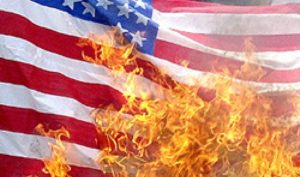So the political world (mostly those on the left) is all up in arms over a tweet sent out by @realdonaldtrump today, which stated:
Nobody should be allowed to burn the American flag – if they do, there must be consequences – perhaps loss of citizenship or year in jail!
Now, upon first glance, it appears that President-Elect Trump is simply speaking in hyperbole, that is to say, an “obvious and intentional exaggeration”. But of course, those who already disagree with him on everything else are certain that he’s fully intent on stripping people’s constitutional rights.
Nonetheless, it does raise a good question, and that is whether or not we as a country should allow flag burning as an acceptable means of protest. Flag burning is nothing new, but every few years or so, depending on the political climate and the crisis of the day, the question arises again.
For example, one Massachusetts college decided to remove the U.S. flag from its main flagpole, and has experienced flag burnings since the election. A group of veterans appeared and conducted a counter-protest, presumably standing for freedom and respect for the ultimate flags.
The legality of flag burning as a form of protest or freedom of speech has long been decided. In 1989, the Supreme Court, in Texas v. Johnson struck down criminal laws banning the burning of the flag as a form of protest. Certainly, President Trump will not have the ability to imprison or strip one’s citizenship for doing so.
But the real question I pose here is SHOULD we declare flag burning illegal? After all, if we as a country decide that flag burning as a means of protest should be illegal, we could simply amend the Constitution. Then the Texas v. Johnson case would no longer have any legs.
But what are we saying if we do that? What would be the purpose behind such a ban? The primary argument that I hear in favor of such a ban is that burning the flag is incredibly offensive. It essentially spits in the face of our veterans, many of whom have given their lives for our freedoms.
Certainly, burning the flag is highly offensive to many Americans. This fact alone, however, should not make it illegal. As Americans, we should (and do) have the freedom to engage in many activities and speech that others find offensive. In fact, offensive speech is the very speech that needs constitutional protection. Speech that is generic, friendly, neutral, and so forth needs no such safeguards, as nobody would try to restrict it. Offensive speech, however, is often the very speech that causes necessary changes in our society, forces us to engage in critical debate, shifts our paradigm, and makes us better.
For those veterans who are protesting, I would ask them what they are really standing up for. If they are standing for freedom, how does banning something they find offensive actually support the notion of freedom? If the government has the ability to decide what is offensive, where does that end?
I don’t really want my government to have that ability. As deeply distasteful as I may find flag burning, I strongly support fellow citizens’ right to engage in protest speech, as long as it does not cross the line into inciting to riot, destruction of someone else’s property, or something along those lines. If I see someone standing in the public square burning a flag, I don’t get offended. I may think the person is stupid, unpatriotic, or an idiot. But in this country, there is no law against citizens being idiots. Thankfully, because each of us has probably fit that description at one time or another.
Freedom is a costly notion. It is not something that we should treat haphazardly or restrict without considering the consequences.

